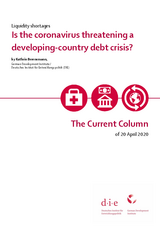The Current Column
Liquidity shortages
Is the coronavirus threatening a developing-country debt crisis?
Berensmann, KathrinThe Current Column (2020)
German Development Institute / Deutsches Institut für Entwicklungspolitik (DIE), The Current Colum of 20 April 2020
Nearly half of all low-income countries are living with high debt levels and have been since before the coronavirus crisis struck, according to estimates by the International Monetary Fund (IMF) and the World Bank. In the wake of the pandemic the debt situation will now get even worse. The crisis is acting like a catalyst: following the end of the raw materials boom, the public finances of many developing countries have deteriorated. According to the IMF, in sub-Saharan Africa government debt in per cent of GDP had risen from an average of 33.1 per cent of GDP between 2010 and 2016 to 50.1 per cent in 2019.
In other words, these countries already have minimal room to manoeuvre as it is. And now the coronavirus pandemic is set to push their tax revenues down and their spending on cushioning its impact up. On top of a healthcare and economic crisis, developing countries are now facing a debt crisis too. How can the international community help to stave off debt crises in the world’s poorest countries?
The only way to prevent a developing-country debt crisis is with a combination of several instruments, most notably immediate liquidity support from creditors in the form of a time-limited debt moratorium and a relief of debt-servicing payments for the poorest highly indebted countries. In the long term, the whole debt management system will need improvement and the international community should finally agree on uniform principles of responsible lending and borrowing, which will then have to be introduced worldwide. The World Bank estimates that sub-Saharan Africa alone needs USD 100 billion for the immediate stimulation of its economy.
At the spring meetings of IMF and World Bank all official bilateral creditors have agreed to provide a moratorium of debt service payments to the poorest countries between May and December 2020. The World Bank estimates that, if all public and private creditors were to waive interest payments in 2020, it would make USD 44 billion in liquidity available to sub-Saharan Africa alone. During a moratorium, the debtor suspends its debt service payments, such as interest, for a set period of time. The major advantage of a moratorium arranged at short notice is that it allows the developing countries in this challenging time to use necessary spending to mitigate the impact of the coronavirus crisis, rather than having to put it towards servicing their debt.
The fundamental disadvantage is that it does not address the underlying causes of the debt problems. The risk is that the debt crisis is merely postponed. In addition, a moratorium could accelerate capital flight and lead to countries’ credit ratings being downgraded. For these reasons, this instrument should only be used if countries are experiencing a severe liquidity shortage. Rather than being seen as a one-size-fits-all solution for all low-income countries, therefore, a moratorium should only be considered for highly indebted ones. Debt limits could be set for this purpose.
Another tool for delivering immediate liquidity assistance is the IMF’s Catastrophe Containment and Relief Trust (CCRT). This fund allows the IMF to waive debt-servicing payments for poor countries tackling a major natural disaster or public health crisis. The organisation added new criteria in late March to enable the CCRT to also be used for pandemics for a large number on countries such as the coronavirus crisis.
To finance the fund, however, the IMF needs to raise more funding from its member states. The wealthy countries with strong economies should therefore provide financial support to replenish the CCRT. To enable more countries to benefit from the initially scant resources available, the IMF can now also grant its debt relief in several tranches. The IMF will use this instrument to provide short-term support to 25 poor countries in the wake of the coronavirus crisis.
However, both moratoria and the CCRT are only short-term measures that do not get at the root causes of debt problems. Further steps are therefore required, including measures to promote sustainable debt structures in developing countries, taking account of reasonable loan terms, interest rates and ratios of domestic to foreign currencies. More countries should support the ongoing activities of multilateral organisations such as the Debt Management Facility of the World Bank and the IMF. Only four G20 member states – Germany, Japan, Russia and the UK – are currently involved in funding this instrument. In addition, the international community should agree on uniform principles of responsible lending and borrowing.
The international community bears joint responsibility for the world’s poorest countries during this pandemic. For this reason, both temporary, immediate liquidity support and long-term measures that address the root causes of indebtedness are important in order to enable these countries to prevent a financial catastrophe on top of a humanitarian one.
This Current Column is part of a special series that is exploring the developmental and socioeconomic consequences of the corona crisis. You can find more articles like this on The Current Column’s overview page.
- Coronavirus as an opportunity for international cooperation
- Why social protection is crucial in the corona crisis
- How we will need to tackle climate migration post-coronavirus
- Parallels between the corona pandemic and climate change
- What we can learn from and about Africa in the corona crisis
- How the EU and rising powers can shape their future sustainably
- How the corona crisis is calling into question the “right to the city”
- Is the coronavirus threatening a developing-country debt crisis?
- Is the pandemic deepening the digital divide?
- Tackling the pandemic without doing away with democracy
- How the international financial institutions are responding to the pandemic
- Assuring equitable access to COVID-19 vaccines and treatments
- The marginalised as the weakest link in pandemics
- Incentives and rules for fair supply chains
- From COVID-19 to climate action
- How to respond inclusively to COVID-19 in the interests of the common good
- Why the Corona crisis is particularly difficult for right-wing populist governments
- What does the EU recovery plan mean for the European Green Deal?
- Growing inequality can worsen the pandemic’s effects
- COVID-19 has not killed global populism
- A fundamental transformation of tax systems is needed in the wake of Covid-19
- Germany’s EU Council Presidency faces a monumental task


